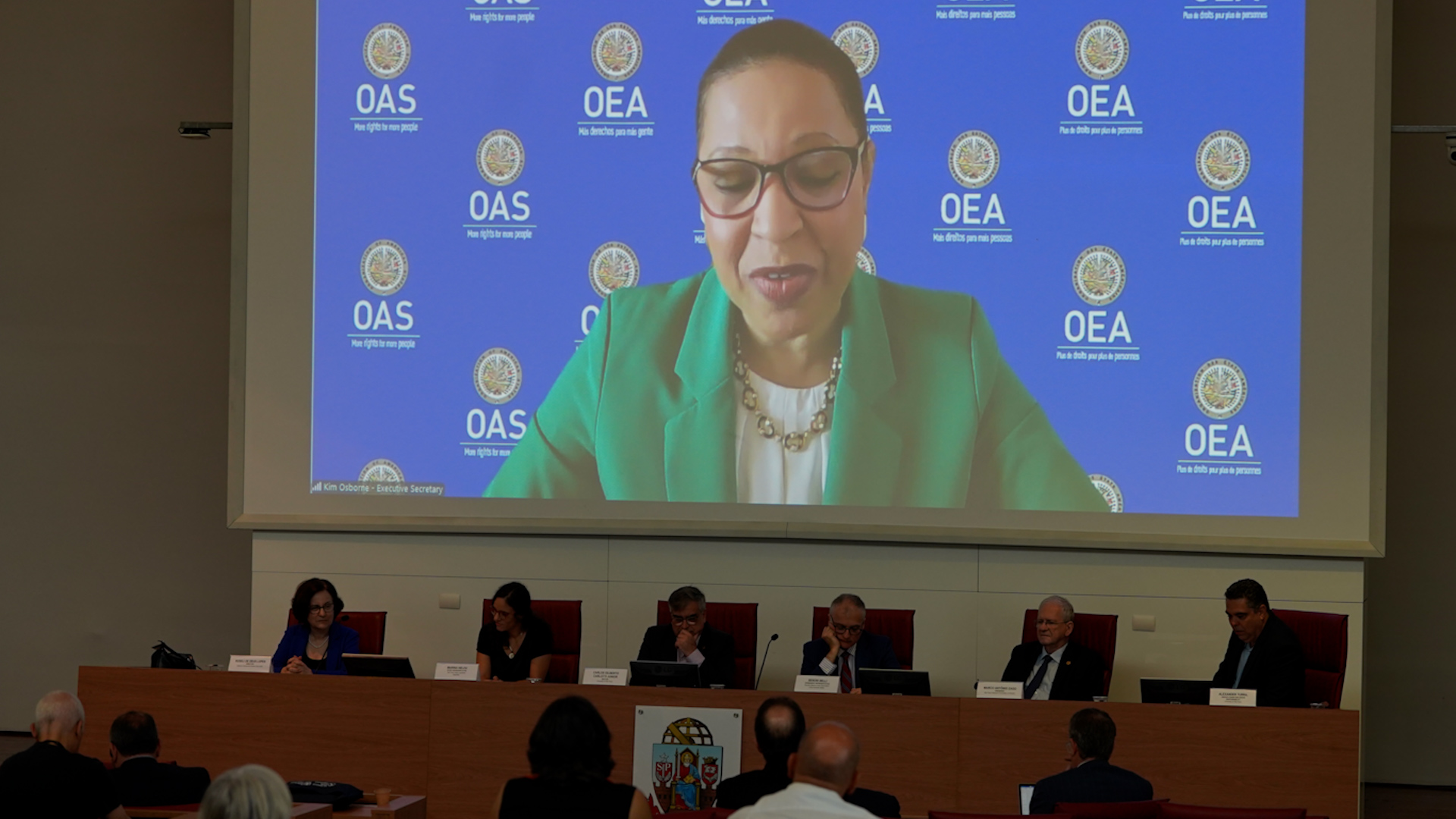

For Kim Osborne, OAS Executive Secretary for Integral Development, USP’s center will be a key component of the organization’s network of Centers of Excellence on Transformative Technologies (photo: Phelipe Janning/Agência FAPESP)
In a ceremony at the University of São Paulo, which hosts the Center of Excellence in Ocean Innovation and Transformative Technologies, researchers and high officials celebrated a partnership set to foster research on ocean sustainability and fuel public policy.
In a ceremony at the University of São Paulo, which hosts the Center of Excellence in Ocean Innovation and Transformative Technologies, researchers and high officials celebrated a partnership set to foster research on ocean sustainability and fuel public policy.

For Kim Osborne, OAS Executive Secretary for Integral Development, USP’s center will be a key component of the organization’s network of Centers of Excellence on Transformative Technologies (photo: Phelipe Janning/Agência FAPESP)
By André Julião | Agência FAPESP – Inova Oceano, the University of São Paulo’s Center of Excellence in Ocean Innovation and Transformative Technologies, has joined the network of Centers of Excellence on Transformative Technologies hosted by the Organization of American States (OAS). A seminar attended by researchers and officials representing state and multilateral institutions was held at the University of São Paulo (USP) on December 3-5, 2024, to celebrate the integration, which will foster interdisciplinary research, innovation, and ocean sustainability.
“UNESCO has declared 2021-2030 the Ocean Decade. I represent the research agency of the state of São Paulo, FAPESP, one of the main supporters of ocean research in Brazil. Many different approaches to protecting the ocean depend on and derive from scientific research. More than a third of all Brazilian publications on the ocean originate in São Paulo state. Most of this research has been supported by FAPESP over the decades,” said Marco Antonio Zago, President of FAPESP, in his opening remarks to the seminar.
Zago recalled that FAPESP funded the purchase of the research vessel Alpha Crucis, operated by the Oceanographic Institute (IO-USP). He also noted that the page of FAPESP’s website on the Sustainable Development Goals (SDGs) adopted by the United Nations lists and describes more than 400 FAPESP-funded projects that support SDG 6 (Clean water and sanitation) and SDG 14 (Life below water).
FAPESP has also funded more than 300 projects in marine life, especially under the aegis of its BIOTA program and its Research Program on Global Climate Change.
“This is an important moment for the University of São Paulo and, I may say, for Brazil, because it’s really significant to have the opportunity for institutional arrangements that enable us to think about the ocean and its relationship with the solutions to the problems we face, not just in Brazil but worldwide,” said Alexander Turra, full professor at IO-USP, coordinator of Inova Oceano, and principal investigator for the FAPESP Program for the South Atlantic and Antarctica (PROASA).
For Kim Osborne, OAS Executive Secretary for Integral Development, USP’s center will be a key component of the organization’s network of Centers of Excellence on Transformative Technologies.
“The goal is to share capacities, address development challenges, and provide solutions to everyday needs of the people of the region. The mandate for the centers focuses on current and future scientific and technological trends, to collaborate in the development of technology foresight studies, research, and data analysis, and to foster informed decision-making by governments, parliaments, private enterprise, and the wider citizenry of OAS member states,” Osborne said.
The event was also attended by Ambassador Benoni Belli, Permanent Representative of Brazil to the OAS, as well as leaders of academic institutions, officers of the Brazilian Navy, State Deputy Marina Helou representing the São Paulo Legislative Assembly (ALESP), and researchers from other countries.
Carlos Gilberto Carlotti Jr., Rector of USP, highlighted his institution’s commitment to the SDGs associated with climate change and sustainability.
“As part of this commitment, we have a very important mission to protect the ocean, and now we have a strong collaboration between USP, CNRS, FAPESP, OAS, and São Paulo state’s lawmakers via ALESP, in a unique situation that favors action to protect the ocean and improve our collaboration with private enterprise and public policy for the ocean,” he said.
Despite the challenges, the collaboration will bolster the hard work being done by all those involved to garner more knowledge of the ocean, assure its protection, and develop this space. “I believe we will have good results within a few years,” Carlotti stressed.
The ocean and sustainable development
The ceremony held to integrate USP’s center into the OAS network was part of day one of the Seminar on Ocean Innovation and Transformative Technologies organized by USP’s Institute of Advanced Studies (IEA). Its aim was to broaden the discussion of ocean-centered initiatives to address the ongoing global crises and foster sustainable development.
The first and second days included presentations on and by four OAS Centers of Excellence on Transformative Technologies, in Argentina, Colombia, Mexico, and Panama, as well as the International Research Center (IRC) established in São Paulo by USP and France’s National Center for Scientific Research (CNRS), with an agenda similar to that of Inova Oceano. The third day was a workshop by invitation only.
A recording of the ceremony and the presentations delivered on day one can be watched at: youtu.be/zAMRsUykQIk?si=AYUqgKl3bgyBWZjJ. A recording of day two is at: youtu.be/QgFhuuXHCag?si=jRGEOd2ZdzHIyHpK.
Republish
The Agency FAPESP licenses news via Creative Commons (CC-BY-NC-ND) so that they can be republished free of charge and in a simple way by other digital or printed vehicles. Agência FAPESP must be credited as the source of the content being republished and the name of the reporter (if any) must be attributed. Using the HMTL button below allows compliance with these rules, detailed in Digital Republishing Policy FAPESP.





